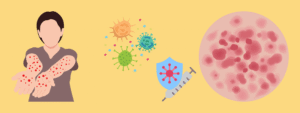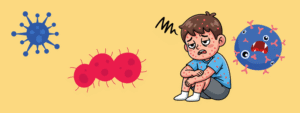Measles Outbreak is still here in this century as Measles is a virus infection by the measles virus ,which is a member of the paramyxovirus family. Mostly transmitted by air as an infected individual sneezes, coughs, or even speaks. The virus may remain alive in the air or on surfaces within two hours, and it is highly contagious.
How infectious is measles?
Measles is an infection of the measles virus that is a paramyxovirus. Measles largely spread through the air as an infected person sneezes, coughs or even speaks. The virus can stay alive in the air or on surfaces during two hours and it is very contagious.
Who’s utmost at threat for measles?
The unvaccinated individuals, individuals too young to be vaccinated (babies younger than 12 months), immunosuppressed personalities, and pregnant women , most vulnerable to measles.
Signs and Symptoms:
Measles Outbreak usually begins with symptoms that resemble a common cold but quickly worsen. The main signs include:
- High fever (often above 104°F or 40°C)
- Cough, runny nose, red watery eyes.
- Small white spots in the mouth (so-called Koplik spots)
- Red rash beginning on the face and extending to the rest of the body.
The rash typically lasts about a week and fades in the same order it appeared.

How Measles Spreads:
Measles usually transmitted by respiratory droplets when an infected individual sneezes or coughs. It is so viral such that nine in ten unvaccinated individuals who contract the virus will be infected.
Transmission facilitated by crowded areas such as schools, playgrounds or even markets, and that is why vaccination is so crucial, particularly in children.
Complications of Measles:
Measles Outbreak commonly regarded as a childhood disease, but it can cause severe complications, in particular, among young children, pregnant women, and individuals with a weak immune system. These may include:
- Ear infections and pneumonia
- Severe diarrhea and dehydration
- Encephalitis (brain swelling)
- Blindness
- Death, in severe untreated cases
Measles is one of the major causes of death among young children in developing countries even though it is preventable.
There’s no cure for measles. After one infected person , the treatment aimed at controlling the symptoms and preventing severe complications.
Inform a healthcare provider incontinently in case he/she infected with measles. You can fit to receive the measles, mumps, and rubella (MMR) vaccine within 72 hours of exposure to lessen inflexibility or help infection completely.
There are some at- home remedies that can help relieve measles symptoms:
- Rest
- Hydrate
Get plenty of rest and take fluids to assist in dehumidification. Manage fever and discomfort. Discuss with your provider what details you can take. Aspirin not recommended. Watch for complications. Symptoms of bacterial infection, pneumonia, or observance infection, which could be treated or covered. It’s also worth mentioning that measles not treated with antibiotics. Follow up as demanded. Keep in touch with you or the healthcare platoon of your child in case of the aggravation of the symptoms or the emergence of new businesses. The best and safest way to help measles is to get a measles vaccine.
Vaccination
One of the best ways to ensure that you and your children not exposed to serious illness, the measles vaccine. The measles vaccine (MMR) is 97 percent effective in offering a lifetime protection against measles. In the few instances where an immunized individual actually catches measles, the disease is normally mild and less contagious.
The Centers of Disease Control and Prevention (CDC) suggest that children and adults should be vaccinated twice.
- Initial dose of MMR: 12-15 months old.
- 2nd dose of MMR: 4-6 years of age.
Your child might receive the MMR vaccine at the age of 6 to 11 months of age, as advised by their healthcare provider, in case you are traveling abroad or there is a local outbreak. Two doses of the recommended routine ages still required by your child to provide long-term immunity. Adults with doubts about their vaccination history or immunity should discuss with their provider whether they should have a dose of the MMR vaccine.
When Measles Outbreak Vaccination not only helps to protect yourself, but also other vulnerable individuals such as your children, babies, pregnant individuals and those with weakened immunity. You as parents would wish to do anything to ensure that your children are safe. Measles vaccination is a painless, well-tested method that may save the life of your child. Measles vaccine is free and 97 percent effective in preventing infection. Prevention is not only necessary but it is also becoming increasingly more common with outbreaks on the increase.

Treatment and Care
Measles does not have a particular antiviral therapy, but supportive care used to relieve the symptoms and avoid complications:
- Take a lot of fluids to keep hydrated.
- Seize a break to enable the immune system to heal.
- Take fever relievers as prescribed by a physician.
- Eat well – vitamin A supplements may help to decrease the intensity of measles in children.
If you suspect measles, isolate the infected person immediately and consult a healthcare professional. Early care can prevent spread and reduce risks.
Why Vaccines Matter for Children:
Since children inherently curious (they put toys in their mouth, touch everything), they also often exposed to germs that may lead to disease or illness. And because the immune system of an infant not fully developed at birth, they are more susceptible to diseases that might become life-threatening in a short period of time. This is the reason why childhood vaccines encouraged.
In Measles Outbreak Childhood vaccinations enable your child to develop immunity prior to getting exposed to diseases such as measles, chicken pox, or whooping cough. Vaccination early in life provides their immune system with an upper hand hence when they contract a life threatening disease their body is ready to combat it.
The Importance of Timely Vaccinations:
Immunizations are best when taken at the recommended intervals, which depend on the stages of development of a child. These plans made to offer protection when required. Most vaccines take time to develop complete immunity by taking several doses. Missing or deferring a dose may expose your child to danger. This is especially important to infants, who are more susceptible to serious disease and complications due to preventable diseases.
Also, childhood vaccines can offer long-term protection, which can last years or a lifetime of protection against such diseases as measles, chickenpox, and whooping cough. Sticking to the immunization plan can ensure your child receives the protection they require.
Protecting the Community
Once a sufficient number of individuals in a community vaccinated, her immunity occurs – This protects even those who unable to be vaccinated, such as infants or individuals with some medical conditions but as soon as the vaccination rates drop, measles can come back within a short period. The recent outbreaks in certain areas demonstrate the vulnerability of this protection.
The recent outbreaks in some regions prove the weakness of this protection.
